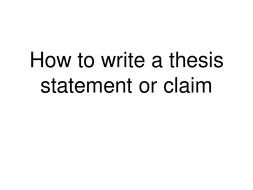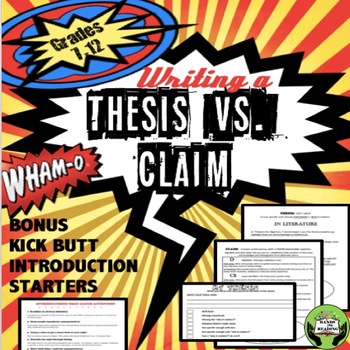Have you ever been tasked with writing an essay or research paper and felt overwhelmed by the seemingly complex world of arguments and claims? Perhaps you’ve stumbled upon the terms “thesis” and “claim” and wondered if they mean the same thing. After all, both are central to making a point, aren’t they? While they share common ground, these concepts are not interchangeable. Understanding their subtle differences is crucial for crafting a compelling and persuasive argument.

Image: thesisideas88.blogspot.com
Imagine yourself as a detective investigating a complex case. You gather evidence, analyze clues, and formulate a hypothesis about what happened. This hypothesis, your working theory, is your thesis – the central argument you aim to prove. The individual pieces of evidence you find, the specific points you use to support your theory, are claims. So, while your thesis is the overarching framework of your investigation, your claims are the building blocks that lend credence to your final conclusion.
Delving Deeper: Unpacking the Essence of Thesis and Claim
Let’s break down these terms further and shed light on their distinct roles within the art of argumentation.
1. Defining the Thesis: The Heart of Your Argument
In essence, a thesis is the core argument of a piece of writing, be it an essay, a research paper, or even a speech. It’s the fundamental assertion you are attempting to prove. A strong thesis statement is concise, specific, and debatable. It’s not simply a factual statement or a personal opinion; it’s a position that can be supported with evidence and reasoning. Think of it as the compass guiding your reader through the landscape of your argument.
Here’s a simple way to understand its role:
- Thesis: The sun rises in the east.
- Claim: The sun’s rising in the east is a result of the earth’s rotation.
This example showcases how the claim provides specific and detailed support for the broader thesis statement.
2. Unveiling Claims: Supporting Evidence for Your Thesis
Claims, on the other hand, are individual points you use to prove your thesis. They are specific assertions derived from evidence and used to back up your main argument. Think of claims as the individual bricks that build the wall of your argument, each contributing to the overall strength and stability of your thesis.
Let’s take another example:
- Thesis: Social media has a negative impact on mental health.
- Claim 1: Studies show a correlation between excessive social media use and increased anxiety and depression.
- Claim 2: The curated nature of social media often creates unrealistic expectations, leading to feelings of inadequacy.
- Claim 3: Cyberbullying and online harassment are prevalent on social media platforms, causing distress and harm to users.
Here, each claim provides a specific reason why social media could negatively affect mental health, ultimately supporting the overarching thesis.

Image: www.teacherspayteachers.com
3. Differentiating Thesis and Claim: Key Differences
- Scope: The thesis sets the overall direction and scope of your argument, while claims focus on specific aspects of the argument.
- Specificity: A thesis should be general and encompassing, while claims should be precise and focused on particular details.
- Relationship: Claims directly support the thesis, providing the evidence needed to prove its validity.
4. Understanding the Interplay Between Thesis and Claim
While distinct, thesis and claim are inherently intertwined. The thesis sets the stage, outlining the argument you aim to advance, while claims are the individual pieces of supporting evidence. It’s like a puzzle; each claim contributes to the larger picture painted by your thesis.
5. Refining Your Argument: Crafting Compelling Claims
- Evidence-Based: Claims should be grounded in facts, research, or reliable sources.
- Logical and Coherent: Your claims need to flow logically and connect to your thesis, each contributing to the overall persuasiveness of your argument.
- Clarity and Conciseness: Ensure your claims are clear, concise, and easily understood by your audience.
6. Beyond the Basics: The Significance of Counterarguments
While evidence for your claims is essential, acknowledging and addressing counterarguments can enhance the credibility and persuasiveness of your work. This involves acknowledging alternative viewpoints, presenting evidence for and against those viewpoints, and ultimately demonstrating why your thesis remains the most compelling position.
Expert Insights: Elevating Your Argumentation Skills
So how do you master the art of crafting strong arguments? Here’s what experts recommend:
- Start with a clear and concise thesis statement: It will act as a roadmap for your entire argument.
- Develop strong claims: Each claim should be backed by solid evidence and contribute to your overall thesis.
- Don’t shy away from counterarguments: Acknowledge and address opposing viewpoints to demonstrate a well-rounded and nuanced understanding of the topic.
Actionable Tips: Putting Theory into Practice
Ready to put your knowledge into action? Here are some practical tips for incorporating these principles:
- Plan your argument: Before you start writing, take time to brainstorm and organize your thoughts.
- Identify your sources: Utilize credible sources and cite them carefully to support your claims.
- Revise and edit: Once you’ve completed your draft, review your argument to ensure it is clear, concise, and logically structured.
Is A Thesis The Same As A Claim
Conclusion: Mastering Argumentation, Empowering Your Voice
Understanding the interplay between thesis and claim is a pivotal step in crafting effective arguments. It’s like understanding the difference between a recipe and its ingredients; both are necessary to create a delicious and satisfying meal. So, the next time you find yourself facing the daunting task of writing an argumentative piece, remember that crafting a strong thesis statement and developing persuasive claims are the building blocks of a powerful and persuasive argument. Embrace the challenge, hone your skills, and let your voice be heard.






